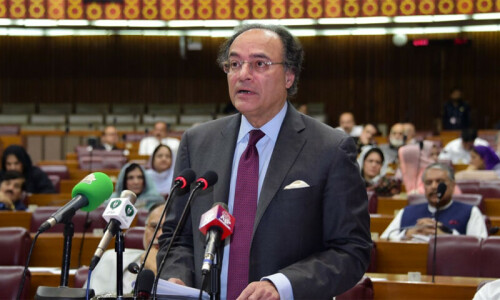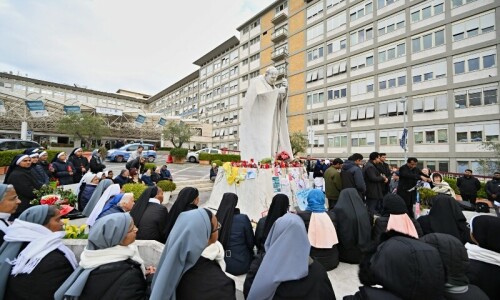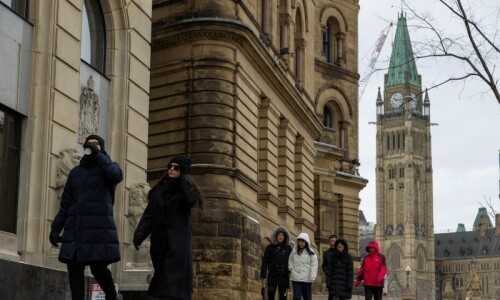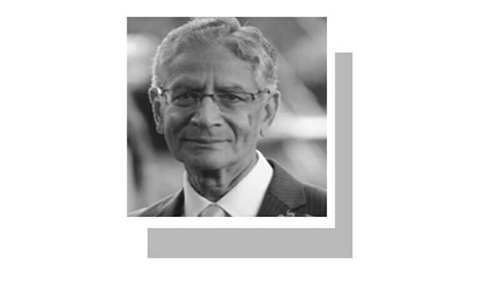• Aurangzeb unveils changes to finance bill, including zero rating on local sales of export industries, stationery items
• Allocations for PSDP cut by Rs250bn, reduced rates for hybrid electric vehicles to continue
• Govt mulls stricter measures for retailers, distributors outside tax net
• Tax rates won’t be increased for those who filed timely returns at least once in last three years
ISLAMABAD: Prime Minister Shehbaz Sharif confirmed on Tuesday that the federal budget for next year was prepared in collaboration with the International Monetary Fund (IMF). His remarks came as Finance Minister Muhammad Aurangzeb announced significant amendments to the proposed finance bill for 2024-25.
“We had to prepare the budget jointly with the IMF” because of the prevailing circumstances and ground realities, the prime minister said in the National Assembly when he took the floor briefly to respond to some points raised by a PTI member regarding the prevailing sense of deprivation in south Punjab, taxes on fertilisers and burden on farmers.
PM Shehbaz expressed hope for a positive response from the lender, but refrained from making a premature statement. He said if the government received any response from the IMF, he would share it with parliament, expressing hope for some “good news”. However, it was unclear if the premier was referring to the IMF bailout or relaxations related to fertiliser.
The prime minister’s statement came shortly after Finance Minister Muhammad Aurangzeb departed from some critical reform measures announced in his budget speech on June 12, apparently after the government came under pressure from some influential industrialists and doled out more taxpayer money to appease public sector employees working in parliament.
The entire staff of the National Assembly and the Senate would get honoraria equivalent to three basic salaries, he said in his winding-up speech on the budget debate in the National Assembly.
Mr Aurangzeb said the government was progressing positively with the IMF, insisting that a bailout was necessary to achieve a sustainable solution to prevailing national economic and financial challenges.
Changes to original budget
Key changes to the original budget include the revival of zero rating (zero sales tax) on local sales of export industries and stationery items. To balance the revenue loss from these amendments to Finance Bill 2024-25, the government has reduced allocations for the Public Sector Development Programme (PSDP) by Rs250 billion.
This amount would now be shown against the Public-Private Partnership (PPP) at Rs350bn instead of Rs100bn earlier, but this notional funding has to come from the private sector, which would be an uphill task.
Besides the PSDP, Mr Aurangzeb announced three major changes to his original budget, including relaxations for hybrid vehicles, stationery items and the Export Facilitation Scheme 2021.
The finance minister also advocated for provincial contribution to expenses of national importance, reduction in provincial expenses and increased provincial resource mobilisation for national financial stability under what he called a “national financial pact”.

He said the budget was “based on homegrown reform plan through which the government wanted to take the country out of the current economic situation for which structural reforms are needed”.
He recalled key points of this plan, including increasing the tax-to-GDP ratio to 13 per cent, implementing state-owned enterprise (SOE) reforms, privatisation, and energy sector reforms, besides giving a central role to the private sector to transform a government-led economy into a market-driven economy.
In addition, he said the plan also envisaged an end to subsidies creating distortions in pricing and efficiencies and building a targeted social protection system through the establishment of a “broad-based and fair taxation system”.
He said the government was committed to these reforms and would provide quarterly progress reports to all the stakeholders.
On budgetary changes, he said that based on recommendations from various stakeholders, including the Senate Standing Committee on Finance, the government had decided to give an opportunity for personal hearing to non-filers of income tax before blocking their phone SIMs or foreign travels.
Likewise, under Section 116 of the Income Tax Ordinance, an explanation will be added to the declaration of foreign assets and assets of spouse in case of spouse being dependent on the taxpayer.
The finance minister also announced that default surcharge in terms of sales tax, income tax or federal excise duty would be charged at the rate of Kibor plus 3 or 12pc, whichever is higher.
On the other hand, Mr Aurangzeb said that stationery items would continue to be exempted from sales tax. In his June 12 budget speech, he announced a 10pc tax sales tax on stationery items.
He also announced changes to fines for late filers and non-filers of income tax, saying the tax rate would not be increased for those who had timely filed tax returns at least once in the last three years.
Likewise, he also announced the continuation of reduced sales tax rates at the existing level for hybrid electric vehicles in Schedule 8 and Serial no. 73 besides the continuation of zero rating on local supplies of the export sector under Export Facilitation Scheme 2021, which was subject to 18pc GST on local sales under the draft financial bill 2024-25. This will have a revenue impact of about Rs10bn.
He promised to accommodate tax exemptions demanded by PPP leader Bilawal Bhutto-Zardari for charity hospitals and to seriously review income tax rebates to professors and said that agriculture, education, health and renewable energy sectors had been protected as much as possible on the instructions of the prime minister.
Strict measures for retailers, distributors
He announced strict measures for retailers and distributors outside the tax net, saying the government was fast-tracking FBR reforms and the prime minister himself was monitoring the digitalisation of FBR under which the scope and operations of track-and-trace system (TTS) and point of sales (POS) would be expanded and tax policy and administration were being separated.
“Time has come to take strict action against retailers who do not participate in the FBR’s Tajir Dost Scheme,” Mr Aurangzeb asserted.
He said it had been decided to heavily increase tax rates on traders, shopkeepers, retailers and distributors who are non-filers under Section 236G and Section 236H. “This will be implemented from July 1, 2024, on all sectors,” he said.
He said the government was also taking expenditure control measures and austerity in the government departments would continue next year as well. In this regard, he also mentioned pension reforms for future expenditure management besides the creation of a committee to recommend the closure and merger of federal ministries or transfer to provinces functions of the devolved ministries.
Mr Aurangzeb announced that the financial requirements of the armed forces and civil armed forces would be met notwithstanding all the difficulties and provided foolproof security to Chinese workers as investment through the second phase of CPEC was at the top of the government priorities.
He also expected the reduced electricity rates and SBP’s policy rate would promote the industrial sector.
The finance minister delivered his winding-up speech with empty front rows as no other minister, except Planning and Development Minister Ahsan Iqbal, was present in the house at that time.
Mr Iqbal was also seen busy in his mobile phone most of the time. In the middle of his speech, Adviser to the Prime Minister Rana Sanaullah, who is not an elected member of the house, came to the assembly hall and sat on a chair in the front row.
Published in Dawn, June 26th, 2024
















































